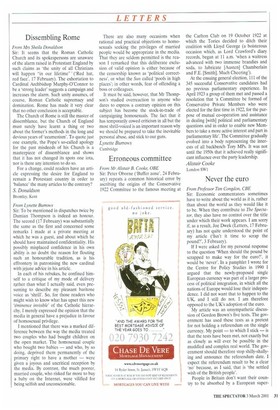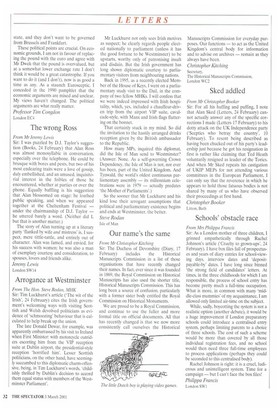Never the euro
From Professor Tim Congdon, CBE Sir: Economic commentators sometimes have to write about the world as it is, rather than about the world as they would like it to be. When they contribute to The Spectator, they also have no control over the title under which their work appears. I am sorry if, as a result, Joe Dwek (Letters, 17 February) has not quite understood the point of my article (Isn't it time to scrap the pound?', 3 February).
If I were asked for my personal response to the question 'When should the pound be scrapped to make way for the euro?', it would be 'never'. In a pamphlet I wrote for the Centre for Policy Studies in 1990 I argued that the newly-proposed single European currency was part of a larger process of political integration, in which all the nations of Europe would lose their independence. I did not want that to happen to the UK, and I still do not. I am therefore opposed to the UK's adoption of the euro.
My article was an unsympathetic discussion of Gordon Brown's five tests. The government has used these tests as a pretext for not holding a referendum on the single currency. My point — to which I stick — is that the tests have been met, not exactly but as closely as will ever be possible in the muddled and complex real world. The government should therefore stop shilly-shallying and announce the referendum date. I expect the referendum result to be a clear `no' because, as I said, that is 'the settled wish of the British people'.
People in Britain don't want their country to be absorbed by a European super state, and they don't want to be governed from Brussels and Frankfurt.
These political points are crucial. On economic grounds, I am not in favour of replacing the pound with the euro and agree with Mr Dwek that the pound is overvalued, but at a somewhat lower exchange rate I don't think it would be a great catastrophe. If you want to do it (and I don't), now is as good a time as any. As a staunch Eurosceptic, I conceded in the 1990 pamphlet that the economic arguments are mixed and unclear. My views haven't changed. The political arguments are what really matter.
Professor Tim Congdon
London EC4













































































 Previous page
Previous page